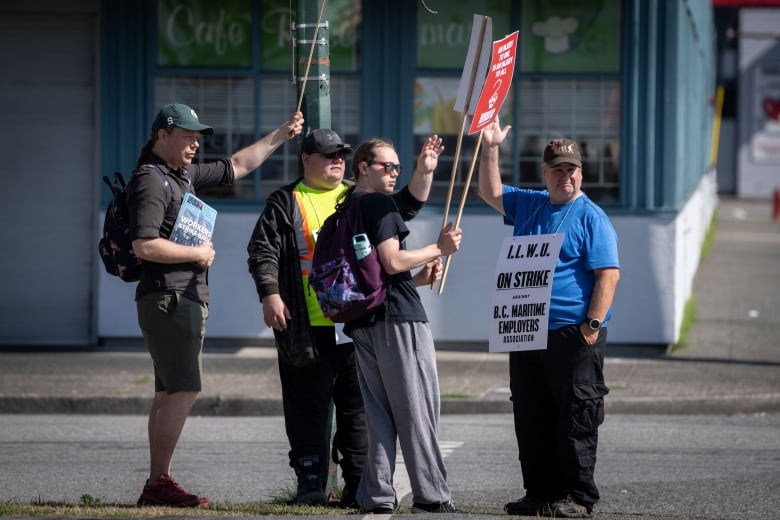Labour talks continue in B.C. port workers’ strike that could have major economic impact | CBC News
Negotiations between port workers and their employer in B.C. carried on into the evening on Canada Day, as the federal labour minister said he would remain in Vancouver during talks.
Port workers across B.C. went on strike Saturday morning in a wide-ranging job action that could impact global shipping.
The International Longshore and Warehouse Union Canada (ILWU) had issued a 72-hour strike notice on Wednesday, and officially walked off the job at 8 a.m. Saturday.
Seamus O’Regan, the federal minister of labour, came to Vancouver in response to the job action. He said on Twitter that “the best deals for both parties” are reached through negotiations, and that federal mediators were assisting during the talks.
“The parties are still at the negotiating table, as they have for well over 24 hours straight,” O’Regan’s press secretary Hartley Witten said in a statement Saturday evening. “Minister O’Regan remains in Vancouver and has no plans to leave town.”
The strike affects about 7,400 terminal cargo loaders and 49 of the province’s waterfront employers at more than 30 B.C. ports including Canada’s busiest, Vancouver.
Contracting out, port automation and cost of living are key issues behind the union’s job action, according to the ILWU.
Their employer, the B.C. Maritime Employers Association, issued a statement saying that bargaining attempts with a federal mediator were unsuccessful over the course of three days.
The ILWU Canada Longshore Division is now on <a href=”https://twitter.com/hashtag/strike?src=hash&ref_src=twsrc%5Etfw”>#strike</a>!<br><br>“We have been working around the clock at Federal Mediation and Conciliation Services since 8am on June 30th to avert a strike.”<a href=”https://twitter.com/hashtag/ilwucanstrike?src=hash&ref_src=twsrc%5Etfw”>#ilwucanstrike</a> <a href=”https://twitter.com/hashtag/digitalpicketline?src=hash&ref_src=twsrc%5Etfw”>#digitalpicketline</a> <a href=”https://twitter.com/hashtag/ilwu?src=hash&ref_src=twsrc%5Etfw”>#ilwu</a> <a href=”https://twitter.com/hashtag/ilwucanada?src=hash&ref_src=twsrc%5Etfw”>#ilwucanada</a> <a href=”https://twitter.com/hashtag/canpoli?src=hash&ref_src=twsrc%5Etfw”>#canpoli</a> <a href=”https://twitter.com/hashtag/bcpoli?src=hash&ref_src=twsrc%5Etfw”>#bcpoli</a> <a href=”https://twitter.com/hashtag/YVR?src=hash&ref_src=twsrc%5Etfw”>#YVR</a> <a href=”https://twitter.com/hashtag/CanadaDay?src=hash&ref_src=twsrc%5Etfw”>#CanadaDay</a> <a href=”https://t.co/3gDNH9E4Mq”>pic.twitter.com/3gDNH9E4Mq</a>
—@joulenejoulene
“Our bargaining committee has made repeated efforts to be flexible and find compromise on key priorities, but regrettably, the parties have yet to be successful in reaching a settlement,” reads the statement.
“We appreciate the assistance of federal mediators in supporting the parties and we remain open to any solutions that bring about a balanced agreement.”
The union said that the decision to strike — which came after an overwhelmingly successful vote from members, with 99.24 per cent of workers voting in favour — was not taken lightly.
“For the future of our workforce we had to take this step. We are still hopeful a settlement will be reached through FREE collective bargaining!” reads a statement from ILWU Canada president Rob Ashton, who added that the bargaining committee was ready to meet and fight for the rights of the working class.
At the Maritime Labour Centre in East Vancouver on Saturday morning, union members gathered and scoured lists posted on outside walls for their picketing assignments.
Striking workers were being dispatched to various port locations, and a small group of ILWU members milled about near the port entrance at Clark and Hastings in East Vancouver on Saturday morning.
The men — wearing placards and buttons depicting a cobra snake and the slogan “will strike if provoked” — all declined to comment on the strike action.

Federal ministers and B.C. Premier David Eby had previously urged the province’s port workers and employers to find a way to avert job action.
Analysts have said a strike could have a significant impact on worldwide shipping and the Canadian economy.
According to the Maritime Employers Association’s website, its members contribute $2.7 billion to the national GDP and handled roughly 16 per cent of Canada’s total traded goods worth $180 billion in 2020.

Cruise ships not affected
The strike notice came nearly three months after the last contract expired on March 30, with the ILWU issuing a statement at the time that accused the employers’ association of demanding “major concessions” from the union despite “record profits during the COVID-19 pandemic.”
On Friday both the union and employer confirmed the strike would not affect cruise ships docked in Vancouver, Prince Rupert or Vancouver Island.

The Canadian Federation of Independent Business said it’s “very concerned” about the strike action, urging all involved parties to cut a deal “as quickly as possible.”
“Port operations must remain fluid so as not to exacerbate supply chain disruptions and put further pressure on costs, at a time when we are still facing high inflation,” the federation said Saturday.
Aaron Sandhar, general manager of Richmond-based Sandhar Trucking, said more than 100 of his employees will be affected by the strike and he hopes for a quick resolution.
“It affects so many different industries,” Sandhar said. “Those containers have everything that we see around us … it’s not like it’s just one type of commodity or two types of commodity. These are literally every single thing you see around you.”
For all the latest Business News Click Here
For the latest news and updates, follow us on Google News.

